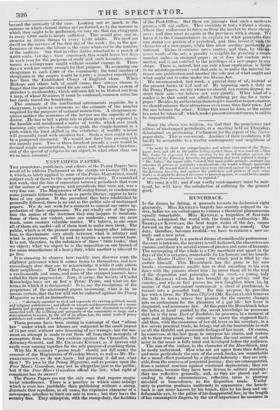UNSTAMPED PAPERS.
THE proprietors, publishers, and editors of the Penny Papers have resolved to address Parliament on the statute 60 George III. cap. 9, which, as lately applied by some of the Police Magistrates, would subject each of them to the newspaper stamp-duty. We remarked last week, that the line of separation between periodicals that were of the nature of newspapers, and periodicals that were not, was a very fine one. The Magistrates of Worship Street, in condemning some journals hitherto looked on as purely literary, appear to have been of our opinion. If the precedent they have established be generally followed, there is an end to the public sale of unstamped papers. We do not wish for a moment to conceal our entire ap- probation of their suppression. We put wholly out of the ques- tion the nature of the doctrines they may happen to inculcate. Some of them are violent, some are moderate; some are mere trash, some contain valuable matter. We believe, in one sense all of them are useful—all of them tend to make men think. The public, which is at the present moment too hungry after informa- tion, to discriminate very nicely between what is salutary and what is pernicious, will by and by acquire a more correct taste. It is not, therefore, to the substance of these "little looks," that we object; what we object to is the imposition on one branch of the same manufacture of a heavy duty, while another is allowed to go free. It is amusing to observe how readily men discover even the slightest grievance when it comes home to themselves, and how exceedingly slow they are to acknowledge it while it only affects their neighbours. The Penny Papers have been circulating for a twelvemonth and more, and none of the stamped journals have called for their suppression. Now, it seems, the Society of Useful Knowledge have set on foot a Penny Paper, and what are the terms in which it is designated? It is, say the resolutions of the proprietors of the unstamped papers (assuming, what is by no means certain, that the law will not be enforced against the Penny Magazine as well as themselves), . . . "obviously intended to rival and supersede the existing political, moral, and religious publications; and affords an unequivocaldemonstration of a mono-
polizing and grasping spirit, a desire to suppress all fair discussion on subjects connected with the wellbeing and prosperity of the community at large, and a determination to secure, by the aid of an odious law, the entire trade of penny publishers and venders of weekly periodicals."
These persons have been rioting in contempt of that "odious law" under which our labours are subjected to the small impost of 75 per cent. without once dreaming of our wrongs; but the mo- ment an attempt is made to cut them off from their monopoly of exemption from taxes, they exclaim against the Chancellor, the Attorney-General, and Mr. CHARLES KNIGHT, as if heaven and earth were coming together for the sole purpose of crushing them. Why Mr. KNIGHT'S "penny trash" should not fall under the censure of the Magistrates of Worship Street, as well as Mr. HE- THERINGTON'S, we do not know ; but granting it did not, what then ? To pass by the Penny Magazine, and to pounce upon the Poor Mans Guardian, may not be altogether just to the public; but if the Poor Man's Guardian Offend the law, what right of complaint has its owner?
The Penny Papers are not the only ones that require magis- terial interference. There is a practice in which some indulge which is even less justifiable than publishing without a stamp. Journals that repudiate, in all cases, the expensive character of a newspaper, interfere to limit our sale in town ; but they leave the country free. They .relinquish, with the stamp-duty, the facilities of the Post-Office. But there are journals that such a moderate process will not suffice. They circulate in town without a stamp, where they endeavour to drive us from the market by their cheap- ness; and they meet us again in the provinces with a stamp. We leave it to the Commissioners to explain on what principles they can stamp one portion of a periodical, and thus invest it wigs-the character of a newspaper, while they allow another portion0e.go untaxed. Either it contains news matter, and then, by thelix- press words of the act, a penalty is exigible for printing a single number unless on stamped paper; or it does not contain news matter, and is not entitled to the privileges of a newspaper in any shape. There is, indeed, but one rule whose application is liable to no misinterpretation; and that rule is, to make the interval be- tween one publication and another the sole test of what ought and what ought not to cchne under the Stamp Act.
We recommended, last week, a general duty of ld., instead of the present duties of 311d. and 4d. By imposing such a duty on the Penny Papers, we are aware we should, to a certain degree, re- strict their sale—we believe not very greatly. What kind of a . reader is he that could not afford a farthing per day for a news- paper? Besides, by authorizing them to give insertion to news matter, we should enhance their attractions even more than their price. Let the one balance the other. Either this must be done, or the entire tax must be taken off; which, under present circumstances, is said to be impracticable.


























 Previous page
Previous page